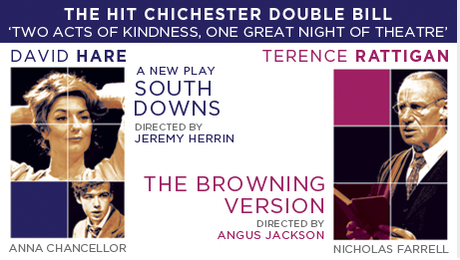
David Hare’s new play, South Downs, transfers to the West End from Chichester in a double bill with Terence Rattigan’s The Browning Version (1948), whose estate commissioned Hare’s work. South Downs is set in 1962, in a school very like Lancing College, where David Hare went. It resembles Rattigan’s play in that both center upon unexpected acts of kindness; South Downs sees John Blakemore (played by Alex Lawther) as a lonely boy given sympathy by the mother of one of the prefects (Anna Chancellor). Jeremy Herrin directs. In contrast, the Rattigan, staged by Angus Jackson, sees a failing classics master, Andrew Crocker-Harris (Nicholas Farrell), emotionally responding to a present from a pupil with resounding results. The double bill is on at the Harold Pinter Theatre, SW1. Critics, from The Telegraph to bloggers, are ecstatic.
Truths about the human condition. David Hare captures perfectly “the posturing, questioning and awkwardness of adolescence, and we only wish the piece could go on longer,” said Fiona Mountford in The Evening Standard. But then we wouldn’t get to The Browning Version, which “packs more truths about the human condition into 70 minutes than most other dramas could manage in a month.”
Not a dry eye in the house. It’s even better than it was in Chichester, gushed Charles Spencer in The Daily Telegraph. South Downs has a “rare tenderness”, its hero a “self-portrait of Hare in his youth, which lends this play a moving resonance and depth.” It’s “beautifully directed”, with all the “rituals, the hymns, and the routine cruelties of boarding school life” captured “with superb precision.” Meanwhile, The Browning Version has never been “better staged.” Farrell is “extraordinary”, and the effect is “devastating.” “If you can sit through this play dry-eyed you must be made of steel.”
Is Rattigan getting creaky? Many themes link this “wonderful pairing,” said Dominic Maxwell in The Times. Both have “scholarly central characters” who “understand all the strange things that ordinary people don’t understand, yet don’t understand all the things that ordinary people understand.” South Downs is “buoyant”, which, though “highly personal”, is also “witty, vivid, erudite and always enjoyable.’ Alex Lawther nails the part. It’s a “whipsmart marvel.” Rattigan, by contrast, can seem “creaky.” But the “ideas dig deep.”
A perfect pairing. Both plays, too, said Michael Coveney in The Independent, study “pain” and “stoicism”, writing about “pupils and teachers in the context of the classical touchstones of Alexander Pope and Aeschylus; intellectual integrity and domestic tragedy.” Hare’s “smartness and edginess” matched with Rattigan’s “cool, insistent humanity” make an “ideal” and “rewarding” double act. “Hare can summon Pope’s rigour as a poet to describe the value of cages in allowing us to feel free. There’s a sense of life stretching dismally ahead in both plays, even as the bell rings for dinner, or chapel, or prep.”
Truly lightening the spirit. “I prefer The Browning Version,” said the There Ought to Be Clowns theatre review blogger: “it’s a multi-layered and achingly beautiful play in which Rattigan’s enforced homosexual repression finds the most touching of voices,” adding that “Hare’s South Downs, to my mind at least, panders a little more to an enduring interest in the public school world that holds little interest to my comprehensive-educated mind, but ultimately fits in well with this double bill which goes a long way to show us, no matter how small it is perceived to be or to whom it is given, just how far an act of kindness can travel to truly lighten the spirit.”

